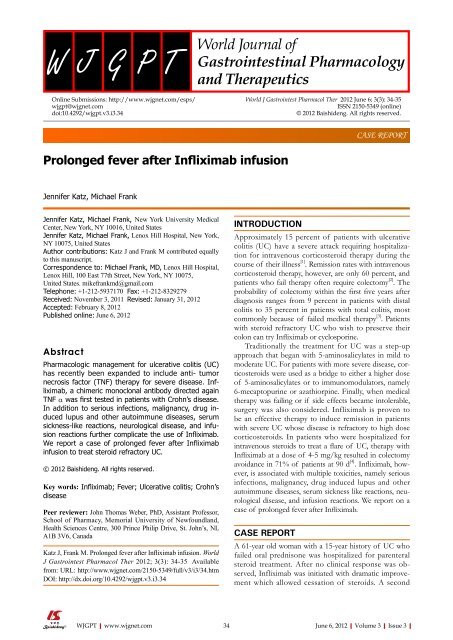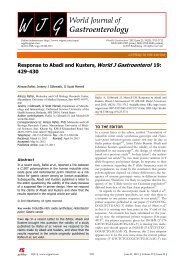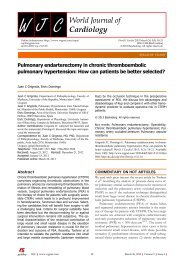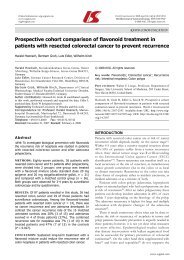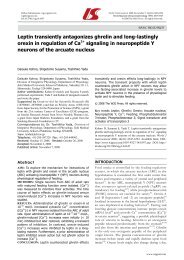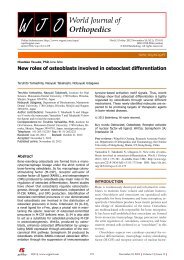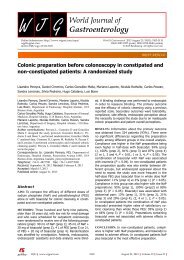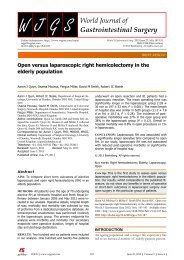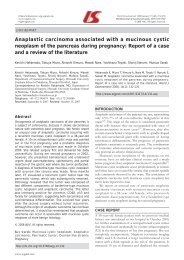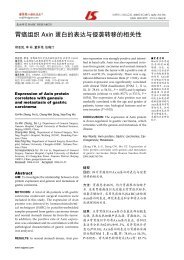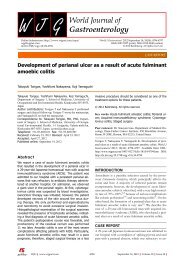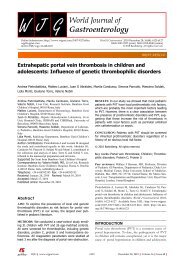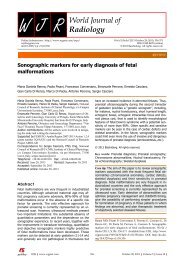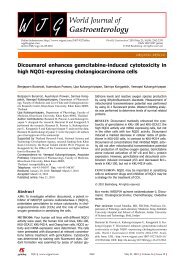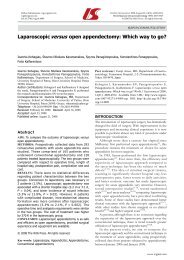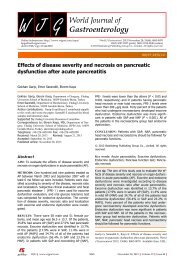World Journal of Gastrointestinal Pharmacology and Therapeutics
World Journal of Gastrointestinal Pharmacology and Therapeutics
World Journal of Gastrointestinal Pharmacology and Therapeutics
You also want an ePaper? Increase the reach of your titles
YUMPU automatically turns print PDFs into web optimized ePapers that Google loves.
Online Submissions: http://www.wjgnet.com/esps/<br />
wjgpt@wjgnet.com<br />
doi:10.4292/wjgpt.v3.i3.34<br />
Prolonged fever after Infliximab infusion<br />
Jennifer Katz, Michael Frank<br />
Jennifer Katz, Michael Frank, New York University Medical<br />
Center, New York, NY 10016, United States<br />
Jennifer Katz, Michael Frank, Lenox Hill Hospital, New York,<br />
NY 10075, United States<br />
Author contributions: Katz J <strong>and</strong> Frank M contributed equally<br />
to this manuscript.<br />
Correspondence to: Michael Frank, MD, Lenox Hill Hospital,<br />
Lenox Hill, 100 East 77th Street, New York, NY 10075,<br />
United States. mikefrankmd@gmail.com<br />
Telephone: +1-212-5937170 Fax: +1-212-8329279<br />
Received: November 3, 2011 Revised: January 31, 2012<br />
Accepted: February 8, 2012<br />
Published online: June 6, 2012<br />
Abstract<br />
Pharmacologic management for ulcerative colitis (UC)<br />
has recently been exp<strong>and</strong>ed to include anti- tumor<br />
necrosis factor (TNF) therapy for severe disease. Infliximab,<br />
a chimeric monoclonal antibody directed again<br />
TNF α was first tested in patients with Crohn’s disease.<br />
In addition to serious infections, malignancy, drug induced<br />
lupus <strong>and</strong> other autoimmune diseases, serum<br />
sickness-like reactions, neurological disease, <strong>and</strong> infusion<br />
reactions further complicate the use <strong>of</strong> Infliximab.<br />
We report a case <strong>of</strong> prolonged fever after Infliximab<br />
infusion to treat steroid refractory UC.<br />
© 2012 Baishideng. All rights reserved.<br />
Key words: Infliximab; Fever; Ulcerative colitis; Crohn’s<br />
disease<br />
Peer reviewer: John Thomas Weber, PhD, Assistant Pr<strong>of</strong>essor,<br />
School <strong>of</strong> Pharmacy, Memorial University <strong>of</strong> Newfoundl<strong>and</strong>,<br />
Health Sciences Centre, 300 Prince Philip Drive, St. John’s, NL<br />
A1B 3V6, Canada<br />
Katz J, Frank M. Prolonged fever after Infliximab infusion. <strong>World</strong><br />
J Gastrointest Pharmacol Ther 2012; 3(3): 34-35 Available<br />
from: URL: http://www.wjgnet.com/2150-5349/full/v3/i3/34.htm<br />
DOI: http://dx.doi.org/10.4292/wjgpt.v3.i3.34<br />
WJGPT|www.wjgnet.com<br />
<strong>World</strong> J Gastrointest Pharmacol Ther 2012 June 6; 3(3): 34-35<br />
ISSN 2150-5349 (online)<br />
© 2012 Baishideng. All rights reserved.<br />
INTRODUCTION<br />
CASE REPORT<br />
Approximately 15 percent <strong>of</strong> patients with ulcerative<br />
colitis (UC) have a severe attack requiring hospitalization<br />
for intravenous corticosteroid therapy during the<br />
course <strong>of</strong> their illness [1] . Remission rates with intravenous<br />
corticosteroid therapy, however, are only 60 percent, <strong>and</strong><br />
patients who fail therapy <strong>of</strong>ten require colectomy [2] . The<br />
probability <strong>of</strong> colectomy within the first five years after<br />
diagnosis ranges from 9 percent in patients with distal<br />
colitis to 35 percent in patients with total colitis, most<br />
commonly because <strong>of</strong> failed medical therapy [3] . Patients<br />
with steroid refractory UC who wish to preserve their<br />
colon can try Infliximab or cyclosporine.<br />
Traditionally the treatment for UC was a step-up<br />
approach that began with 5-aminosalicylates in mild to<br />
moderate UC. For patients with more severe disease, corticosteroids<br />
were used as a bridge to either a higher dose<br />
<strong>of</strong> 5-aminosalicylates or to immunomodulators, namely<br />
6-mecaptopurine or azathiorpine. Finally, when medical<br />
therapy was failing or if side effects became intolerable,<br />
surgery was also considered. Infliximab is proven to<br />
be an effective therapy to induce remission in patients<br />
with severe UC whose disease is refractory to high dose<br />
corticosteroids. In patients who were hospitalized for<br />
intravenous steroids to treat a flare <strong>of</strong> UC, therapy with<br />
Infliximab at a dose <strong>of</strong> 4-5 mg/kg resulted in colectomy<br />
avoidance in 71% <strong>of</strong> patients at 90 d [4] . Infliximab, however,<br />
is associated with multiple toxicities, namely serious<br />
infections, malignancy, drug induced lupus <strong>and</strong> other<br />
autoimmune diseases, serum sickness like reactions, neurological<br />
disease, <strong>and</strong> infusion reactions. We report on a<br />
case <strong>of</strong> prolonged fever after Infliximab.<br />
CASE REPORT<br />
A 61-year old woman with a 15-year history <strong>of</strong> UC who<br />
failed oral prednisone was hospitalized for parenteral<br />
steroid treatment. After no clinical response was observed,<br />
Infliximab was initiated with dramatic improvement<br />
which allowed cessation <strong>of</strong> steroids. A second<br />
34 June 6, 2012|Volume 3|Issue 3|


